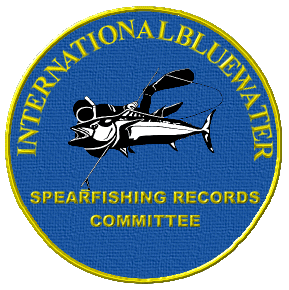RESULTS
OF THE FIRST LA PAZ INTERNATIONAL BLUE WATER MEET, 1999
RESULTS
OF THE SECONT LA PAZ INTERNATIONAL BLUE WATER MEET—OUR FIRST OFFICIAL IBSRC
WORLD CUP, 2000

WORLD RECORD CERTIFICATION FOR BLUEWATER FISH
The mission of The International Bluewater
Spearfishing Records Committee (IBSRC) is to promote ethical, safe and sporting
spearfishing practices, to establish uniform regulations for the compilation of
world-bluewater gamefish records, and to provide basic spearfishing guidelines for use in
bluewater contests and any other bluewater spearfishing activities worldwide.
Up from the depths comes a huge steel-grey tube scattering bait fish in its wake. It's
almost within range when you recognize it as the largest fish you've ever seen-possibly a
world record. You shoot. As the fish rockets into the depths you wonder what you must do
to preserve this catch as a world record.
Your first thought must be safety. The blue water is deep, dangerous and filled with
powerful fish capable of drowning you in a line tangle, or maiming you in an attack. Your
potential record might tow you into an offshore current or out to sea at night. Only when
you satisfy this safety requirement should you consider your actions to preserve your
record.
With the astounding increase in awareness of bluewater hunting as a separate and bona fide
sport worldwide came the realization that while many countries have functioning
organizations for their national records, there is no international organization dedicated
to bluewater records.
An international group agreed to formulate an organization for the certification of world
records-the IBSRC. Two main goals emerged. The first goal was to establish a committee to
evaluate each country's historical records and combine them into a worldwide registry.
Eligible fish are bluewater species such as tuna, marlin, wahoo and sailfish. To keep the
committee international, these species must be available to divers on more than one
continent, thus yellowtail (kingfish) made the list but white seabass (mulloway) did not.
The other goal was to establish and publicize a set of rules by which future records would
be judged. These rules stress safety and provide specific criteria for performance.
Basically, the rules call for the catch to be made independently and unassisted. Because
bluewater hunting is inherently dangerous and safety problems such as shark attack,
nightfall, fatigue, etc. might prevent one from meeting the record criteria, the late Bill
Kroll recommended a special award for those meeting all the criteria for a record but for
one safety-related infraction. Such near-record catches are recognized by a separate and
prestigious class of Meritorious Awards. Meritorious Awards are also available for
outstanding catches that while not world records are still noteworthy.
Since the Underwater Society of America (USOA) has a functioning non-profit organization
in place with goals similar to the International Bluewater Spearfishing Records Committee
(IBSRC), it was approached to sponsor the committee. With the enthusiastic support of the
USOA, the committee soon grew to 33 governing members. In keeping with its goal as a truly
international organization, members include recognized bluewater divers from such
countries as Australia (6), New Zealand (2), Greece (2), South Africa (2) Brazil (1)
England (1) Mexico (1) and France (2). |
![]()